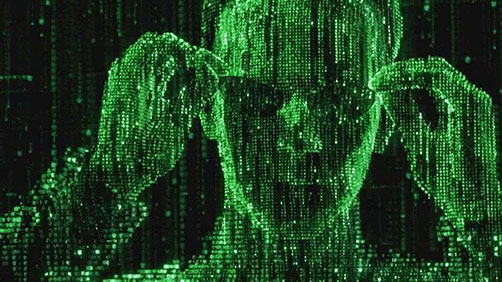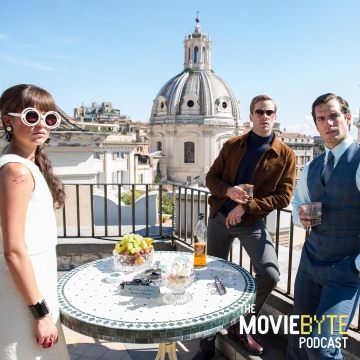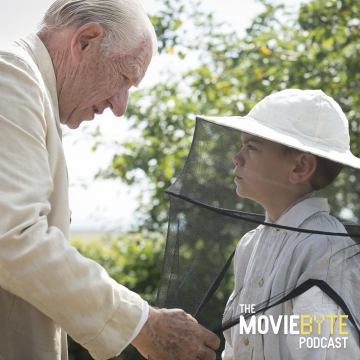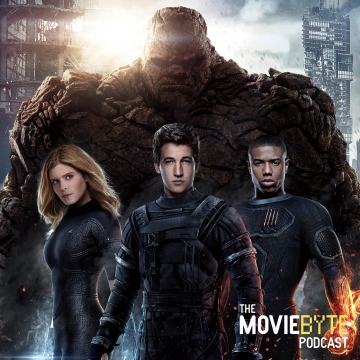
“The Matrix is everywhere. It is all around us. Even now, in this very room. You can see it when you look out your window or when you turn on your television. You can feel it when you go to work… when you go to church… when you pay your taxes. It is the world that has been pulled over your eyes to blind you from the truth.”
Ever since the inception of The MovieByte Podcast, and the MovieByte site, I have looked forward to this day with some trepidation. You see, The Matrix is one of my all-time favorite films, and something like “your favorite film” is so subjective, and there are people out there who cannot stand this film. When I first really started getting into films and filmmaking, this was one of the films that really captured my interest. I was enraptured by the plot, stunned by the visual effects, and enthralled by the characters. It is safe to say that my love of this film is unmatched by any other film I can think of. It has everything I love about the modern era of filmmaking.
I’ve written a few reviews now, and recorded a few podcasts, but I still have some fear that I will not properly convey my feelings about this film. Indeed, I still have no idea how I am going to capture the proper essence of it. But I am going to give it a try.
Rewatch
As my wife will testify, this is one of those films that I watch entirely too often for almost anyone’s taste. But this time, it has actually been about a year and a half since I last saw the film. And yet, I found myself able to recount every story beat, that is how well I know this film. So it is hard to bring any sense of objectivism to the viewing for me at this point. But actually, I think that is okay.
There are a number of levels on which this film still works even today, and why I think if it had never been made until now, and appeared on the big screen exactly as it was in 1999, it would still work very well and have great success. This is because, while the film is a technological wonder, and the technical prowess involved is quite a feat for a film in 1999, it is ultimately the story that you care about as the viewer. The film dealt with some very heady concepts and went to some very dark places, but it is primarily a story about character development, as I would argue that all great films are.
Story

I love the way this film opens and is already conveying concepts to the audience in a way that doesn’t necessarily spoil the big reveal to Neo of what The Matrix is. We begin at a cliched green command prompt telling us a trace is running. We begin zooming into this text, and with a lot of CGI trickery the scene eventually resolves itself into “reality”.
Suddenly, the woman speaking on the phone, Trinity, is doing impossible things and kicking some butt. And I really love this scene: Agents show up outside the building and chastise a police officer for not following orders and waiting for the agents. “I think we can handle one little girl,” the officer says. “No lieutenant,” the lead agent says, “your men are already dead.”
So apparently, Trinity, and the agents have very special super powers.
Then we begin to find out who this Neo character is. He knows Trinity as someone who hacked the IRS database, and he thought Trinity was a guy. Something is special about Neo though. He seems to be a natural born computer hacker, and he has trouble with authority.
All the agents know about Neo is that Morpheus, an infamous “terrorist” is trying to get in touch with Neo, so they kidnap and bug him. As Morpheus tells Neo, “if they knew what I know, you would probably be dead.”
And then we come to the heart and soul of The Matrix. At this point, if you’ve never watched the film, you are still trying to figure out what The Matrix is. You may have some ideas, but again, try to remember back when this first big reveal happened. As Neo meets Morpheus, we begin to understand that The Matrix is more than we imagined it might even be. Neo has been living in a dream world all his life. His physical body has been in a tank, plugged in to the computer world. Morpheus and co. rescue him. Now Neo must understand who he is and the nature of what is going on.
More importantly, a war is being waged between man and machine. Mankind is enslaved to the machines, a few fight for freedom.
Red Pill / Blue Pill

I would be remiss if I didn’t mention the scene involving Neo deciding which pill to take. It has become iconic, it has become a symbol. To call someone a blue pill, or to “take the blue pill” is to buy into propaganda, to continue to sleep. The Red pill of course is to embrace the truth however much it may hurt.
This pop culture symbol comes straight from this film. I still would like to know what the blue pill would have done, but the red pill’s function is to insert a trace program into Neo’s digital self in The Matrix that is designed to “interrupt his input/output carrier signal,” which is just a nice way of saying it will wake Neo up.
Dream World
The Matrix is, to me, a brilliant conceptual plot device: anthropomorphized programs, code interacting with humans in a virtual world, the idea that in a virtual world, you are not necessarily limited to the physicality of that world, allowing for people to indeed be “superhuman” in that virtual environment. As Morpheus says to Neo in training when Neo cannot understand how Morpheus beat him, “Do you believe that my being stronger or faster has anything to do with my muscles in this place? You think that’s air you’re breathing now?” This world is all digital. Nearly anything is possible. You must “unlearn what you have learned and free your mind.”
But you can die in this dream world, for the body cannot live without the mind. If you are killed in The Matrix, you die in the real world. This is of course necessary to raise the stakes and make the drama real, but it also works conceptually, I think.
And of course, you can’t leave The Matrix without an exit. This is possibly a little harder to swallow, but it works for the story.
CGI

What we currently think of when we consider CGI was, in 1999, really still in its infancy. Or I suppose perhaps it would be more appropriate to say it was in it’s pre-teen years. Whereas now we are just entering, or perhaps only nearing the adult life of CGI, back then the technology was more costly and less realistic. This is why The Matrix is really a miracle of the technology of the age.
And yes, sometimes things don’t look as good as they would if they were rendered now. However, to some extent that actually works in the film’s favor. Because we are in a virtual world, when something doesn’t look quite real, our mind can instinctively say, that’s because it isn’t.
And that’s not to say that the CG work isn’t incredible, because it is. The Matrix actually pioneered a technique known as bullet time. As I understand it, multiple cameras are placed in a semi-circle around an actor, then the action can be slowed almost to a stop while the camera appears to swoop around the action in a circular pattern. The computer puts the image together based on the images from the cameras arranged in semi-circular fashion. It is a compelling technique, and one that works well.
Characters
A story is nothing without characters and good character development. Every primary character in this film has good character development, which is one of the primary reasons why I rate this film so highly. A compelling concept, coupled with a well executed telling of said story, and great characters with great character development is usually what makes for a good film. The Matrix has all this in spades.

Neo, as our primary protagonist obviously grows the most. He must come a complete 180 degrees, he must learn how to fight in the battle for humanity. And, he must make a decision, to risk it all to save Morpheus from sacrificing himself, or to sit back and let it happen. Ultimately, Neo starts out in a place of disbelief and weakness. When Morpheus is instructing him on how to escape the agents, he doesn’t make it very far before he’s cowering in fear. And through the film we see him growing out of this, learning that he can do what is necessary.
Trinity is of course our resident love interest, but she is so much more than that. Appearing at first as a tough super-woman, we discover Trinity’s soft side. Ultimately coming to grips with Neo as the one who can fight the needed battles in The Matrix.
Morpheus may have the least character development in the film, as somewhat of a one note character, but he plays a powerful and important role, one that cannot be discarded. He frees Neo from The Matrix and he must guide Neo and help him find his way.
And of course, the infamous Agent Smith. He develops in unexpected ways as a computer program. He wants out of The Matrix, he will do anything to get the computer codes to the human city’s main frame. Throughout the course of the film he goes from smooth and controlled to increasingly agitated and angry, becoming Neo’s worst nightmare as a villain.
Thematic Elements
If you like dystopian sci-fi, The Matrix has that for you. The film takes place at an unknown point of time in the far future. At the heart of the film is the idea that technology may have consequences, machines ruling over man and enslaving him.
And the film certainly drew on imagery and ideas from Christianity, Greek mythology, Gnosticism, Buddhism, Hinduism, Nihilism, Taoism, comic books, and more. It also deals with questions of morality, free will, what is reality and things of like nature.
It very much blurs the lines between man and machine. They speak of the idea of sentient programs. While I personally do not believe this could ever happen, it does make for a great sci-fi theme.
Pacing
One of the things I love about this film is it’s pacing. So many modern films miss this entirely. Many of today’s action movies are exercises in non-stop chaos. This is not the case with The Matrix. There are many well done action scenes, but this film also takes the time to settle down, to explore character and personality, to wonder through scenes, to let us have a break from the action.
Stylistic
Yet another aspect of this film that I love so much is the visual styles used. When in The Matrix, everything has a sort of washed out feel and green cast to it. In the real world, there’s much more contrast, more grittiness, more earthiness.
I love the camera play with sunglasses and reflections. You will find it in many places if you are looking, but the most striking use is when Morpheus is offering the choice of pills to Neo. This is great cinematography.
In one of the great examples of focus in cinematography, the scene that I often refer people to is very near the beginning of the film. As Trinity is trying to get out of The Matrix before the agents catch up to her, we cut to a scene of a phone ringing on the side of the street. We hang there for a moment, then the focus changes, and we see Trinity standing a good ways back. The camera never changed positions in this shot, but the focus changed: another great cinematic moment.
I also love how the action scenes were filmed. Instead of going the route of shaking the camera around, randomly blowing things up, and generally causing unfollowable chaos, instead the action is often put into slow motion, sometimes to the extreme. I actually really love this.
Ultimately, The Matrix packs some very rich visuals that go along nicely with the well told story.
Music
While the Soundtrack may not live up to the expectations of say, a Hans Zimmer scored film, it did work and there is some good originality here by composer Don Davis (not of Stargate SG1 fame, obviously). There is plenty of techno music and some punk as one might expect for a film like this, but there are actually some nice, orchestral musical moments in the film. And the film’s main theme is a haunting and compelling one. There is, throughout the original score, both haunting, and beautifully compelling moments. I actually consider it quite well done and very fitting for the feel and genre of the film.
Acting

The lead actors in this film all did great jobs. I cannot think of a single actor who could have been cast better, or acted their part better.
Keanu Reeves is often much derided for his acting abilities, but I daresay even those that think ill of his abilities usually will not argue that he was right for this role.
Carrie-Anne Moss as Trinity was an absolute joy to watch. She was our connection to Neo as the audience, and of course her character and performance needed to be likable and identifiable for us to believe that Neo could fall in love with her. And she knocked it out of the park.
I cannot think of Laurence Fishburne without picturing Morpheus. To me they are one and the same.
And though I cannot stand his performance as Elrond in Peter Jackson’s Lord of the Rings, nevertheless, Hugo Weaving’s performance here as Agent Smith is perhaps his best. He certainly made us believe in sentient programs.
Sequels

Unfortunately, following up on The Matrix‘s success, the two sequels did not live up to expectations. I may or may not review those on MovieByte in the future, but I was deeply disappointed in those films. The Wachowskis took the franchise in directions I did not like, and delved into themes unworthy of the first film. The travesty that is the second film is by far the worst perpetration of stupidity upon the franchise. The third film was somewhat better, I in fact did not hate it as much as most seem to, but it also did not live up to the bar of great filmmaking set up by The Matrix.
Thankfully, this film stands well enough on it’s own. Though you can easily visualize sequels, it doesn’t demand one the way some films might. That might be thought of as a weakness since it was always hailed to be the first in a trilogy, but given that the second and third films were such a disappointment, I rather think this is a good thing.
In Conclusion
I know that so much more could be said about this film. And I don’t know if I have adequately summed up my feelings about the film at all. Regardless of whether you ultimately like this film, its style of story telling, its visual style, its themes and motifs, it is certainly worth watching at least once if you are even remotely a fan of film. I personally think this is an example of a very well made film, very well executed, and worth of all five stars.


